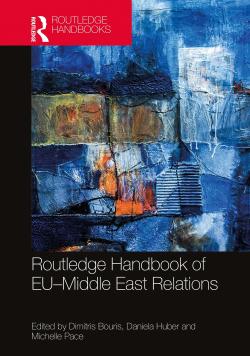Routledge Handbook of EU–Middle East Relations

EU–Middle East relations are multifaceted, varied and complex, shaped by historical, political, economic, migratory, social and cultural dynamics. Covering these relations from a broad perspective that captures continuities, ruptures and entanglements, this handbook provides a clearer understanding of trends, thus contributing to a range of different turns in international relations. The interdisciplinary and diverse assessments through which readers may grasp a more nuanced comprehension of the intricate entanglements in EU–Middle East relations are carefully provided in these pages by leading experts in the various (sub)fields, including academics, think-tankers, as well as policymakers. The volume offers original reflections on historical constructions; theoretical approaches; multilateralism and geopolitical perspectives; contemporary issues; peace, security and conflict; and development, economics, trade and society. This handbook provides an entry point for an informed exploration of the multiple themes, actors, structures, policies and processes that mould EU–Middle East relations. It is designed for policymakers, academics and students of all levels interested in politics, international and global studies, contemporary history, regionalism and area studies.
List of figures, p. xii-xiii
List of tables, p. xiv
List of contributors, p. xv-xxi
Foreword, by Nathalie Tocci and Maha Yahya, p. xxii-xxiv
Preface/Acknowledgments, p. xxv-xxvi
Acronyms and abbreviations, p. xxvii-xxxii
1. Introduction: entanglements in EU–Middle East relations, by Dimitris Bouris, Daniela Huber and Michelle Pace, p. 1-11
Part I. History
2. Europe and the Ottoman Empire: images of self and the other, by Senem Aydın-Düzgit, Johanna Chovanec and Bahar Rumelili, p. 15-25
3. French and British colonialism and its legacy in the MENA region, by Sune Haugbølle and Roberto Mazza, p. 26-35
4. Longue-durée reflections on anti-colonial movements in the Middle-East (1798–today), by Nora Lafi, p. 36-46
5. A postcolonial critique of EU–Middle East relations, by Somdeep Sen, p. 47-56
Part II. Theoretical perspectives
6. Everyday Middle Easts, by Ali Bilgic, p. 59-69
7. The EU’s constructions of the Middle East, by Münevver Cebeci, p. 70-80
8. Security within and beyond the borders of Europe: locating the European Union as a security actor, by Zeynep Arkan Tuncel, p. 81-91
9. International Relations theory and EU–Middle East relations, by Filippo Dionigi, p. 92-101
10. From descriptive and evaluative accounts to causal explanations for EU–Middle East relations, by Fred H. Lawson, p. 102-112
11. Postcolonial theory and EU–Middle East relations: recognising co-constitutions, by Nora Fisher-Onar, p. 113-123
12. Feminist and queer perspectives on EU–Middle East relations, by Hanna L. Muehlenhoff, p. 124-134
Part III. Multilateralism and geopolitical perspectives
13. In the shadow of the European neighbourhood: political geographies of EU–Middle East relations, by Virginie Mamadouh, p. 137-146
14. The EU and Arab regionalism, by Silvia Ferabolli, p. 147-156
15. The EU and the Gulf Cooperation Council: a troubled relationship, by Tobias Schumacher, p. 157-168
16. EU foreign policy incoherence in the United Nations: the case of the Middle East, by Ioannis Galariotis and Maria Gianniou, p. 169-180
17. The Transatlantic relationship and the Middle East: converging interests, diverging praxis, by Andrea Dessì and Vassilis Ntousas, p. 181-190
18. Turkey and the European Union in the Middle East: potential for cooperation or continuing discord?, by Meltem Müftüler-Baç and Damla Cihangir-Tetik, p. 191-203
19. Russia and the EU in the Middle East: from mutual distrust to forced cooperation?, by Maxim A. Suchkov and Polina Vasilenko, p. 204-214
Part IV. MENA–EU relations in the contemporary world
20. Perceptions of the EU: activists and public opinion in the Middle East, by Andrea Teti, Gennaro Gervasio and Pamela Abbott, p. 217-230
21. Populist politics in Europe and their impact on EU Relations with the Middle East: EU–Turkey relations as a case study, by Ayhan Kaya, p. 231-241
22. EU–Israeli relations: geopolitical perspectives in the wake of nationalist populism, by Sharon Pardo and Dani Filc, p. 242-252
23. On EU–Arab Democratisation: towards a democratic “learning loop”, by Larbi Sadiki and Layla Saleh, p. 253-264
24. Moderate Islamist parties in the MENA region and Europe: between the democracy–human rights nexus and the stability–security nexus, by Djallil Lounnas, p. 265-275
25. Inter-religious dialogue in the Euro-Mediterranean region: a multi-stakeholder approach, by Eleonora Insalaco, p. 276-286
26. EU–Egypt relations at a crossroads, by Gerasimos Tsourapas, p. 287-297
27. Winds of change? Negotiating gender relations in the Middle East and North Africa, by Annette Jünemann, p. 298-308
Part V. Peace, security and conflict in the Middle East
28. The European Union and the Israeli-Palestinian conflict: how Member States came together only to fall apart again, by Federica Bicchi and Benedetta Voltolini, p. 311-320
29. EU–Lebanon relations, by Assem Dandashly, p. 321-332
30. The EU in post-2003 Iraq, by Maria Luisa Fantappie, p. 333-343
31. EU–Afghanistan relations, by Oz Hassan, p. 344-355
32. EU–Syria relations, by Anis Nacrour and Jouanah Ghori, p. 356-366
33. The European Union and Yemen, by Vincent Durac, p. 367-376
34. The EU and Iran: how a critical relationship became a troubled one, by Cornelius Adebahr and Riccardo Alcaro, p. 377-387
35. EU–Middle East relations and the fight against terrorism, by Francesco Milan, p. 388-398
Part VI. Development, economics, trade and societal issues
36. Aid, security and fortress Europe: EU development aid in the Middle East and North Africa, by Emile Badarin and Jeremy Wildeman, p. 401-410
37. Migration and refugees in EU–Middle East relations, by Beste İşleyen and Tamirace Fakhoury, p. 411-421
38. Europe and MENA youth, by Emma Murphy, p. 422-431
39. Assessing EU–Middle East trade relations: patterns, policies and imbalances, by Nora Aboushady and Chahir Zaki, p. 432-446
40. Their violence or ours? EU–Middle East arms sales and military cooperation, by David Wearing, p. 447-456
41. Clean growth for the benefit of both? Towards a more inclusive approach to EU–MENA environmental relations, by Martin Keulertz and Musa McKee, p. 457-469
Index, p. 470-475
Topic
Tag
Related content
-
Ricerca09/10/2019
EU-Middle East Network in Action – EUMENIA
leggi tutto


